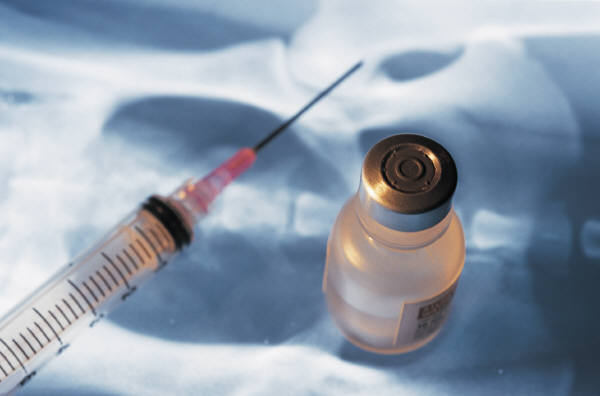Vaccinations
Vaccines are preparations of killed microorganisms, living weakened microorganisms, etc. introduced into the body to produce immunity to a specific disease by causing the formation of antibodies.
 Vaccines are very delicate compounds, which if handled or administered incorrectly will be ineffective or neutralized. Vaccines are very delicate compounds, which if handled or administered incorrectly will be ineffective or neutralized.
Vaccines are administered initially as a two-shot series and then annually or semiannually.
The vaccines and vaccine protocols listed below are tailored to our practice and geographic location and follow the guidelines of the AAEP. (see bottom of page for link)
Venezuelan, Eastern, & Western Encephalomyelitis (VEE, WEE, EEE): Encephalomyelitis is caused by a virus, which is transmitted by mosquitoes. The virus causes inflammation of the brain and spinal cord. The vaccine is very effective against the disease. We recommend administrating the vaccine once a year (annually). However, if you live in a higher risk area (i.e. more mosquitoes), then the vaccine should be administered twice a year (semiannually), to keep the levels of circulating antibodies higher in the horse.
Tetanus Toxoid: Tetanus is a disease caused by a specific toxin of a bacillus (Clostridium tetani) which usually enters the body through wounds. It is characterized by spasmodic contractions and rigidity of some or all of the voluntary muscles (especially of the jaw, face and neck). The bacteria can be found in the soil or in horse manure. The vaccine is very effective and administered yearly. The vaccine is boostered in case of laceration, surgery, or penetrating wounds.
Rabies: Rabies is a viral disease that infects the nervous system of mammals. It is transmitted through contact with the saliva of infected animals. It is 100% fatal. The vaccine is given yearly and is very effective.
West Nile Virus: West Nile virus is transmitted by mosquitoes. The virus causes inflammation of the brain and spinal cord. In most areas, with a seasonal mosquito population, we recommend annual vaccination. In areas with a longer mosquito season (Florida, Coastal areas, Long Island) we recommend vaccination on a biannual basis (twice per year). Horses that travel to Florida should be boostered 2 weeks before traveling. Veterinarians in some problem areas vaccinate 4x per year.
Rhinopneumonitis: Rhinopneumonitis is a herpes virus which causes respiratory infections, abortions, and inflammation of the spinal cord. The vaccine is not 100% effective and the protection only lasts 3-6 months. Pregnant mares should be vaccinated at 5, 7, and 9 months from the breeding date. Horses that are traveling to shows, races, sales, etc. should be vaccinated every 3 months. Pleasure horses that do not travel should be vaccinated twice a year. The vaccine does not protect against the neurologic form of the disease.
Influenza: Influenza is a virus that causes high fever and respiratory infection. The vaccine is not 100% effective, and the protection is shorter lived. Horses traveling to shows, sales, racing events, etc., should be vaccinated every 3 months. Pleasure horses that do not travel should be vaccinated at least twice a year.
Potomac Horse Fever (PHF): Potomac Horse Fever is caused by the parasite Ehrlichia risticii. Horses are infected through small land snails that carry the parasite. These snails are found only in certain parts of the United States (i.e. the Potomac River Basin). It is not contagious and occurs more commonly in wet areas. The disease causes high fever, laminitis, and severe diarrhea. The vaccine is fairly effective and is administered twice a year to horses that will be traveling or residing in those areas. It is administered more frequently in problem areas.
Strangles: Strangles is a bacterial disease caused by Streptococcus equi. It is highly contagious and causes the following signs: high fever, abscessed lymph nodes, and respiratory infection. Horses may develop guttural pouch infections, sinus infections, purpura hemorrhagica, laryngeal paralysis, and bastard strangles. There is an intranasal vaccine which is more effective and associated with less side effects than the intramuscular vaccine. The vaccine is given once a year, except in endemic barns (those that have frequent outbreaks or previous contamination) where semiannual vaccination is recommended.
|